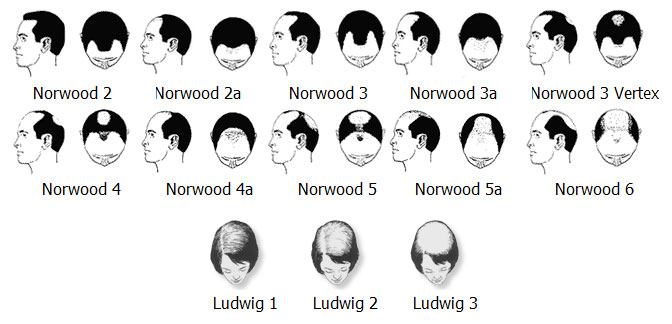What is the most common type of hair loss?
The most common type of hair loss in both men and women is androgenetic alopecia also known as male/female pattern baldness. This is an hereditary condition that can be inherited from either parent and progressively worsens as one ages. By age 50 it affects 50% of men and 50% of women and develops into the typical patterns of baldness.
What medical treatments work?
Propecia (finasteride) and Rogaine (minoxidil) are the only FDA approved medications for the treatment of androgenetic alopecia. Propecia, a prescription pill, works by blocking the hormone dihydroxytestosterone (DHT) which causes hair loss in genetically susceptible men. Rogaine, a topical over the counter (OTC) solution or foam, is a direct hair growth stimulant and is approved for use in both men and women. Both of these drugs if effective need to be continued indefinitely.
What surgical treatments work?
Androgenetic alopecia that is unresponsive to medication or that has been persistent can be treated surgically with hair transplantation which produces natural undetectable results. Minimally invasive robotic procedures are now available that offer a faster recovery, less postoperative pain and no linear scar.
What are other types of hair loss?
- Telogen effluvium is a sudden shedding of scalp hair that is more common in women. It commonly occurs after pregnancy, illness, emotional stress or from certain medications. Typically it lasts three months and is usually reversible.
- Alopecia areata is a common cause of hair loss in adults and children which appears as circular patches of baldness on the scalp. This condition may improve spontaneously but can be effectively treated in the office with localized superficial injections and topical therapy.
- Traction alopecia is seen mostly in girls and women who wear tight braids or ponytails resulting in a band of hair loss across the front of the scalp. If noticed early this condition is reversible with a change in hair style. If not it can lead to permanent hair loss from continued tension on the hair follicles.


